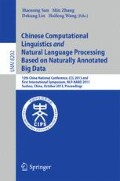Abstract
Data selection is a significant technique to enhance the data-driven models especially for large-scale natural language processing (NLP). Recent research on statistical machine translation (SMT) domain adaptation focuses on the usage of various individual data selection models. In this paper, we proposed a hybrid data selection model named iCPE, which combines three state-of-the-art similarity metrics: Cosine tf-idf, Perplexity and Edit distance at both corpus level and model level. We conduct the experiments on Hong Kong Law Chinese-English corpus and the results show that this simple and effective hybrid model performs better over the baseline system trained on entire data as well as the best rival method. This consistently boosting performance of the proposed approach has a profound implication for mining very large corpora in a computationally-limited environment.
Access this chapter
Tax calculation will be finalised at checkout
Purchases are for personal use only
Preview
Unable to display preview. Download preview PDF.
References
Brown, P.F., Pietra, V.J.D., Pietra, S.A.D., Mercer, R.L.: The mathematics of statistical machine translation: Parameter estimation. Computational Linguistics 19(2), 263–311 (1993)
Daumé III, H., Jagarlamudi, J.: Domain adaptation for machine translation by mining unseen words. In: Proceedings of the 49th Annual Meeting of the Association for Computational Linguistics: Human Language Technologies, ACL HLT 2011 (2011)
Mansour, S., Ney, H.: A simple and effective weighted phrase extraction for machine translation adaptation. In: IWSLT (2012)
Koehn, P., Haddow, B.: Towards effective use of training data in statistical machine translation. In: Proceedings of the Seventh Workshop on Statistical Machine Translation, pp. 317–321 (2012)
Civera, J., Juan, A.: Domain adaptation in statistical machine translation with mixture modeling. In: Proceedings of the Second Workshop on Statistical Machine Translation, pp. 177–180 (2007)
Foster, G., Kuhn, R.: Mixture-model adaptation for SMT. In: Proceedings of the Second ACL Workshop on Statistical Machine Translation, pp. 128–136 (2007)
Eidelman, V., Boyd-Graber, J., Resnik, P.: Topic models for dynamic translation model adaptation. In: Proceedings of the 50th Annual Meeting of the Association for Computational Linguistics: Short Papers, vol. 2, pp. 115–119 (2012)
Matsoukas, S., Rosti, A.V.I., Zhang, B.: Discriminative corpus weight estimation for machine translation. In: Proceedings of the 2009 Conference on Empirical Methods in Natural Language Processing, vol. 2, pp. 708–717 (2009)
Hildebrand, A.S., Eck, M., Vogel, S., Waibel, A.: Adaptation of the translation model for statistical machine translation based on information retrieval. In: Proceedings of EAMT, vol. 2005, pp. 133–142 (2005)
Lü, Y., Huang, J., Liu, Q.: Improving statistical machine translation performance by training data selection and optimization. In: Proceedings of the 2007 Joint Conference on Empirical Methods in Natural Language Processing and Computational Natural Language Learning (EMNLP-CoNLL), pp. 343–350 (2007)
Moore, R.C., Lewis, W.: Intelligent selection of language model training data. In: Proceedings of the ACL 2010 Conference Short Papers, pp. 220–224 (2010)
Axelrod, A., He, X., Gao, J.: Domain adaptation via pseudo in-domain data selection. In: Proceedings of the Conference on Empirical Methods in Natural Language Processing, pp. 355–362 (2011)
Levenshtein, V.I.: Binary codes capable of correcting deletions, insertions and reversals. Soviet Physics Doklady 10, 707 (1966)
Koehn, P., Senellart, J.: Convergence of translation memory and statistical machine translation. In: Proceedings of AMTA Workshop on MT Research and the Translation Industry, pp. 21–31 (2010)
Leveling, J., et al.: Approximate sentence retrieval for scalable and efficient example-based machine translation. In: COLING 2012, pp. 1571–1586 (2012)
Papineni, K., Roukos, S., Ward, T., Zhu, W.J.: BLEU: a method for automatic evaluation of machine translation. In: Proceedings of the 40th Annual Meeting on Association for Computational Linguistics, pp. 311–318 (2002)
Wang, L.Y., Wong, D.F., Chao, L.S.: TQDL: Integrated models for cross-language document retrieval. International Journal of Computational Linguistics and Chinese Language Processing (IJCLCLP) 17(4), 15–31 (2012)
Wang, L.Y., Wong, D.F., Chao, L.S.: An improvement in cross-language document retrieval based on statistical models. In: Processing of the 24th Conference on Computational Linguistics and Speech (ROCLING 2012), pp. 144–155 (2012)
Stolcke, A., et al.: SRILM-an extensible language modeling toolkit. In: Proceedings of the International Conference on Spoken Language Processing, vol. 2, pp. 901–904 (2002)
Chen, S.F., Goodman, J.: An empirical study of smoothing techniques for language modeling. In: Proceedings of the 34th Annual Meeting on Association for Computational Linguistics, pp. 310–318 (1996)
Wang, L.Y., Wong, D.F., Chao, L.S., Xing, J.W., Lu, Y., Isabel, T.: Edit Distance: A new data selection criterion for SMT domain adaptation. In: Proceedings of Recent Advances in Natural Language Processing (2013)
Zhang, H.P., Yu, H.K., Xiong, D.Y., Liu, Q.: HHMM-based Chinese lexical analyzer ICTCLAS. In: Proceedings of the Second SIGHAN Workshop on Chinese Language Processing, vol. 17, pp. 184–187 (2003)
Wang, L.Y., Wong, D.F., Chao, L.S., Xing, J.W.: CRFs-based Chinese word segmentation for micro-blog with small-scale data. In: Proceedings of the Second CIPS-SIGHAN Joint Conference on Chinese Language, pp. 51–57, December 20-21 (2012)
Koehn, P.: Europarl: A parallel corpus for statistical machine translation. In: MT Summit, vol. 5 (2005)
Koehn, P., et al.: Moses: Open source toolkit for statistical machine translation. In: Proceedings of the 45th Annual Meeting of the ACL on Interactive Poster and Demonstration Sessions, pp. 177–180 (2007)
Och, F.J., Ney, H.: A systematic comparison of various statistical alignment models. Computational Linguistics 29(1), 19–51 (2003)
Federico, M., Bertoldi, N., Cettolo, M.: IRSTLM: an open source toolkit for handling large scale language models. In: Proceedings of Interspeech, pp. 1618–1621 (2008)
Author information
Authors and Affiliations
Editor information
Editors and Affiliations
Rights and permissions
Copyright information
© 2013 Springer-Verlag Berlin Heidelberg
About this paper
Cite this paper
Wang, L., Wong, D.F., Chao, L.S., Lu, Y., Xing, J. (2013). iCPE: A Hybrid Data Selection Model for SMT Domain Adaptation. In: Sun, M., Zhang, M., Lin, D., Wang, H. (eds) Chinese Computational Linguistics and Natural Language Processing Based on Naturally Annotated Big Data. NLP-NABD CCL 2013 2013. Lecture Notes in Computer Science(), vol 8202. Springer, Berlin, Heidelberg. https://doi.org/10.1007/978-3-642-41491-6_26
Download citation
DOI: https://doi.org/10.1007/978-3-642-41491-6_26
Publisher Name: Springer, Berlin, Heidelberg
Print ISBN: 978-3-642-41490-9
Online ISBN: 978-3-642-41491-6
eBook Packages: Computer ScienceComputer Science (R0)

